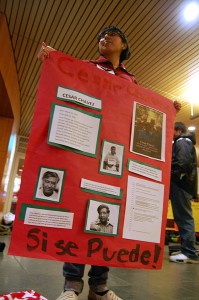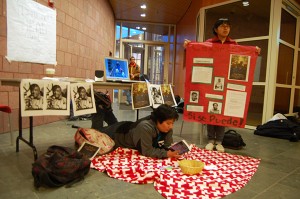 Though César Chávez died 16 years ago, his activist spirit was alive and well at Grinnell College on Tuesday, as members of Student Organization of Latinos/Latinas (SOL) commemorated the 82nd anniversary of the late labor organizer and civil rights activist’s birthday.
Though César Chávez died 16 years ago, his activist spirit was alive and well at Grinnell College on Tuesday, as members of Student Organization of Latinos/Latinas (SOL) commemorated the 82nd anniversary of the late labor organizer and civil rights activist’s birthday.
Chávez ascended to national prominence through his role as a labor organizer in the American West and as a founder of the United Farm Workers of America (UFW). Since then, he has evolved into an iconic figure for a bevy of social movements, particularly those concerned with labor and immigration rights.
SOL President Lizeth Gutierrez ’12, who assisted with tabling outside the dining hall, said she felt a responsibility for educating the campus about Chávez.
“It was interesting having people here not knowing him at all. I couldn’t believe it actually,” Gutierrez said. “I felt it was a certain responsibility to really inform my peers about him because he was very important, especially in my culture and for what he stands for as well.”
After finishing the eighth grade, Chávez dropped out of school to become a full-time migrant worker alongside the rest of his family. His activism began in the 1950s with the Community Service Organization, a Latino civil rights group.
In 1962, Chávez helped found the National Farm Workers Association, the predecessor to the UFW, which today is the country’s largest farm workers union and is active in over ten states.
To raise awareness of Chávez and his causes, SOL members set up a table outside the dining hall featuring literature and a video about the life and activities of the late union organizer.
SOL member Lupe Rubio ’10 echoed the importance of Chávez. “We’ve known about him since we were little. Especially when I go back and visit my grandpa, he’ll talk about him,” she said. “He makes a really, ‘you should not forget who this man is, because it’s really important.’”
SOL members also distributed pins featuring the UFW logo, an Aztec eagle inspired in part by the symbolism of the Mexican flag and designed by Chávez’s cousin, Manuel. According to César Chávez, the iconic symbol was conceived of “to get some color into the movement, to give people something they could identify with.” Organizers estimated that over 180 students received and displayed the pins on their clothing.
As most people filed into the dining hall for dinner, SOL members and other students stopped briefly at the table to symbolically fast and reflect on Chávez’s work before continuing on to dinner. The short moments were intended to honor Chávez’s last fast before his death in 1993.

Chávez was a powerful political figure. He was instrumental in Robert F. Kennedy’s victory in the California primaries during his abortive 1968 presidential campaign. Chávez’s grassroots organizing spurred unprecedented turnout among the state’s Latino voters which helped secure a victory for Kennedy. Some commentators have argued that Chávez’s turnout activities sowed the seeds for Barack Obama’s successful presidential campaign.
Rubio’s family experienced Chávez’s hands-on involvement directly. “My grandfather used to march in the Caesar Chávez marches, because he was—him and the rest of my family—were grape pickers and lived in the farm, and they had basically no benefits, no rights,” she said. “They actually got to meet Caesar Chávez, because he would go and investigate their standards of living and how they were treated.”
Organizers said they were pleased with the group’s efforts at raising awareness on campus. “I feel like we got the word out. The people that I talked to and the people that I saw were actually interested,” Rubio said. “This school is very liberal, there’s a certain activism that interests everybody on this campus, so hearing about that actually did get a lot of people’s interests.”
SOL is already planning for future activities including potentially bringing a speaker to campus who had worked with Chávez. In addition to the day’s activities, the group is also soliciting signatures for a petition advocating that Congress officially designate March 31st as César Chávez Day; eight states currently officially recognize the holiday.
“For Hispanics he’s like one of the biggest heroes and everyone knows him,” said SOL member Johana Lozano ’11. “He’s like a
Martin Luther King. We just wanted to spread the word. Especially since it was his date, and also because his day is a holiday in some states, but not in all.”




















































